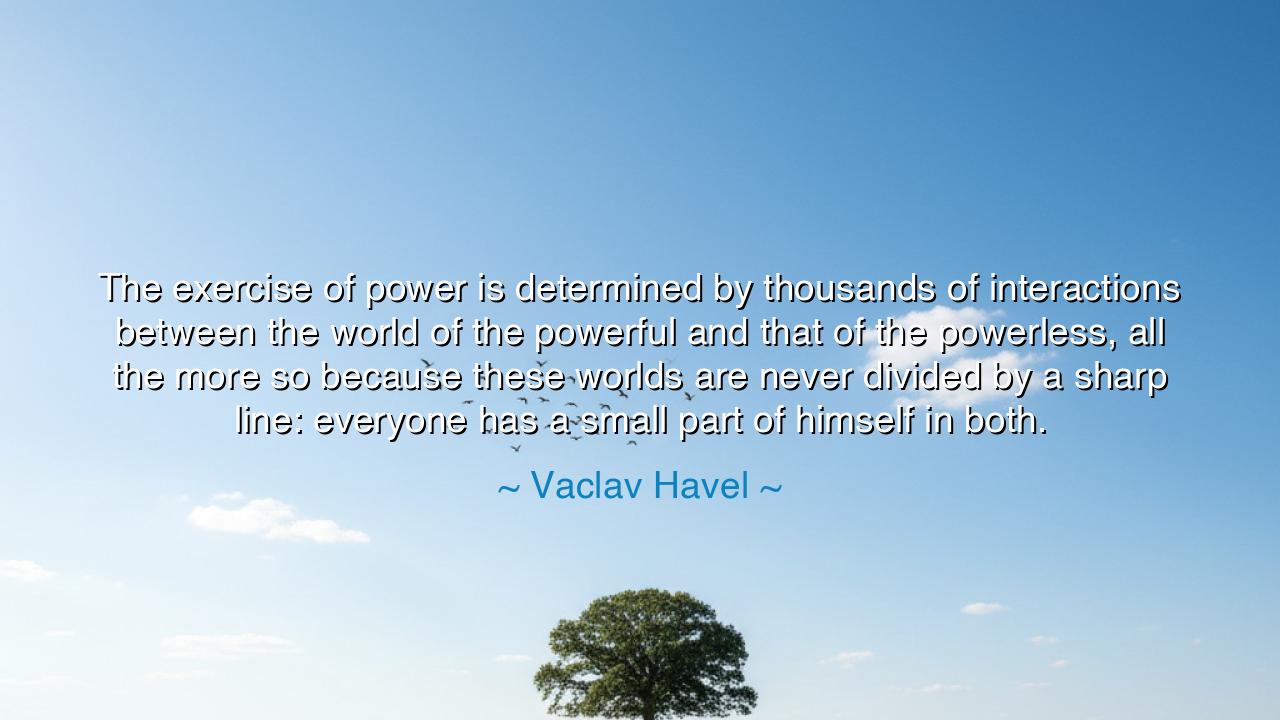
The exercise of power is determined by thousands of interactions
The exercise of power is determined by thousands of interactions between the world of the powerful and that of the powerless, all the more so because these worlds are never divided by a sharp line: everyone has a small part of himself in both.






The words of Václav Havel, “The exercise of power is determined by thousands of interactions between the world of the powerful and that of the powerless, all the more so because these worlds are never divided by a sharp line: everyone has a small part of himself in both,” flow with the deep wisdom of one who lived under oppression and rose to freedom. Havel, dissident turned president, knew that power is not a fortress guarded by a few, nor weakness a prison confined to the many. Instead, power lives and breathes in the countless exchanges between rulers and ruled, between leaders and followers, between the oppressor and the oppressed. And within each person, there is both—some measure of strength, some measure of frailty.
This teaching is ancient in spirit. The Stoics declared that no man is wholly slave and no man wholly master, for all share the same condition of mortality. Marcus Aurelius, emperor of Rome, though clothed in purple, confessed in his Meditations that he, too, was subject to weakness and death. Meanwhile, Epictetus, born a slave, taught kings with the power of his mind. Thus the boundary between the powerful and the powerless is never absolute—it is blurred, shifting, and always shaped by the choices, words, and actions of individuals in daily life.
Havel’s own life proved this truth. Under communist rule in Czechoslovakia, he was imprisoned, censored, and treated as powerless. Yet through his plays, his essays, and his steadfast courage, he influenced minds and kept alive the dream of freedom. In those days, the regime seemed to hold all power, but in reality its survival depended on the silent compliance of ordinary citizens. When enough of those citizens withdrew their obedience, the so-called powerless toppled the mighty. And when Havel rose to lead, he himself was reminded that even as president, his strength still depended on the voices and trust of those he governed. Thus, he carried within him both the memory of the powerless and the burden of the powerful.
History offers many such lessons. Consider Mahatma Gandhi, who in outward appearance was powerless—armed with no army, no throne, no wealth. Yet through his refusal to bow, his insistence on truth and nonviolence, he revealed that power does not rest only in governments or weapons, but also in the spirit of ordinary men and women. Gandhi understood, as Havel later would, that power is not a possession but a relationship, woven from countless interactions between rulers and ruled.
The meaning of Havel’s words, then, is both sobering and empowering. Sobering, because they reveal that no one is ever free from the temptations of power or the vulnerability of powerlessness. Each of us holds authority in some realm—over family, over colleagues, over choices that affect others. Each of us is also subject to forces greater than ourselves. Recognizing this duality keeps us humble, for we see that the line between powerful and powerless runs not between people, but through every human heart.
The lesson for us is clear: if power is shaped by daily interactions, then each word we speak and each act we perform either strengthens justice or strengthens oppression. We cannot shrug responsibility by saying, “I am powerless,” for even silence can sustain injustice. Nor can we indulge arrogance by saying, “I am powerful,” for our authority always depends on the consent, trust, or fear of others. To live wisely is to remember that power is shared, fragile, and constantly exchanged.
The practical action is this: exercise whatever power you have with integrity, remembering that you, too, have known weakness. Treat those beneath you as equals in dignity, for you are not so far from their place. And when you feel powerless, remember that even the smallest act of courage can shift the balance of the world, for the mighty stand only because the many permit them to. By living consciously in this balance, you strengthen both yourself and your community.
Therefore, O listener, engrave Havel’s wisdom upon your soul: “Everyone has a small part of himself in both the powerful and the powerless.” Let this knowledge guard you against tyranny, against despair, and against arrogance. For in every heart beats the potential to oppress or to liberate, to obey blindly or to resist bravely. Choose wisely, and in your daily interactions, you will help weave a world where power serves truth and freedom, not fear.






AAdministratorAdministrator
Welcome, honored guests. Please leave a comment, we will respond soon